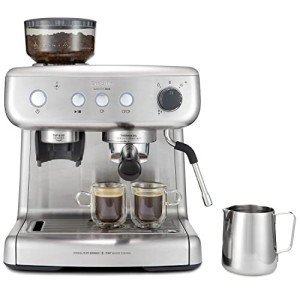Best Espresso Machines: A Comprehensive Guide
Espresso machines have become a staple in coffee culture, bring in enthusiasts and casual drinkers alike. The best shot of espresso can raise the coffee experience, and choosing the right machine is essential for achieving this objective. This post explores the world of espresso machines, checking out a few of the best options offered on the market today. It will cover the types of machines, essential functions to consider, a contrast table, and often asked questions.
Types of Espresso Machines
Before venturing into specific products, it's necessary to comprehend the different types of espresso machines offered:
- Manual Machines: Also called lever machines, these need the user to by hand manage the pressure and flow of water. Dual Boiler Espresso Machines provide a hands-on experience however need more skill.
- Semi-Automatic Machines: These machines automate the pressure and temperature level, while permitting users to manage the shot timing. They are perfect for those who wish to take control without needing excessive effort.
- Automatic Machines: These gadgets automate the developing procedure entirely; users simply select the size and strength of the shot. Steam Espresso Machines for newbies.
- Super-Automatic Machines: This type grinds the beans, tamps, brews, and even froths milk instantly. They're exceptional for benefit, making them ideal for those who want speed without compromising quality.
- Capsule Machines: Utilizing pre-packaged coffee pods, these are the most basic machines for making espresso. While practical, they typically do not have the depth of taste found in newly ground beans.
Secret Features to Consider
When looking for the best espresso machine, a number of crucial features should guide your decision:
- Pressure: The perfect pressure for an espresso machine is 9 bars. This pressure is crucial for extracting flavors efficiently.
- Temperature Control: Consistent water temperature level is crucial for a good espresso. Try to find machines with PID (Proportional Integral Derivative) temperature level control.
- Develop Quality: Machines made from high-quality products tend to last longer and supply a much better experience.
- Size and Footprint: Consider your readily available counter area. Some machines are compact, while others require substantial space.
- Grinder Quality: An integrated grinder offers benefit, but the quality of the grinder impacts the last taste. Doser or doserless types change the flavor profile considerably.
- Alleviate of Use and Cleaning: Consider how simple the machine is to tidy and keep. Steam Espresso Machines with removable parts typically provide simpler cleaning.
Comparison Table of Best Espresso Machines
Here's a contrast table showcasing some of the most recommended espresso machines based on various user reviews and professional ratings:
| Espresso Machine | Type | Pressure (Bars) | PID Control | Grinder Type | Rate Range |
|---|---|---|---|---|---|
| Breville Barista Express | Semi-Automatic | 9 | Yes | Conical burr grinder | ₤ 600 - ₤ 700 |
| De'Longhi EC155 | Manual | 15 | No | No grinder | ₤ 100 - ₤ 150 |
| Rancilio Silvia | Semi-Automatic | 9 | No | No grinder | ₤ 700 - ₤ 800 |
| Saeco Xelsis | Super-Automatic | 15 | Yes | Integrated grinder | ₤ 1,000 - ₤ 1,500 |
| Nespresso VertuoPlus | Capsule | N/A | No | No grinder | ₤ 150 - ₤ 200 |
| Gaggia Classic Pro | Semi-Automatic | 9 | Yes | No grinder | ₤ 400 - ₤ 500 |
Summary of Best Espresso Machines
- For Beginners: The De'Longhi EC155 is an exceptional starting point due to its affordable rate and ease of use.
- For Serious Enthusiasts: The Rancilio Silvia uses a balance between quality and control, attracting those who wish to refine their barista skills.
- For Convenience: The Saeco Xelsis stands apart as a top super-automatic option, ideal for users seeking maximum ease without jeopardizing taste.
Regularly Asked Questions (FAQs)
Q1: What is the best pressure for extracting espresso?A1: The ideal pressure is 9 bars; this pressure level is ideal for drawing out the flavors in espresso.
Q2: How often should I clean my espresso machine?A2: Regular cleaning is necessary. For machines with built-in mills, it is best to clean them after every use. Deep cleaning should be done weekly or regular monthly depending upon usage and model.
Q3: Can I use regular coffee in an espresso machine?A3: Espresso is made from carefully ground coffee, preferably roasted particularly for espresso. While you can use regular coffee, the taste and extraction may differ.
Q4: How long can my espresso machine last?A4: With proper care and upkeep, a high-quality espresso machine can last several years, even decades.
Q5: What grinder should I use for espresso?A5: A burr grinder is more suitable, as it supplies constant grind size which is important for correct extraction.
The journey to finding the best espresso machine can be an interesting one, filled with discovery and potential for developing one's coffee taste buds. Whether going with the simplicity of a capsule machine or the control of a manual model, understanding the different types and functions can significantly improve the experience. With advances in innovation and innovation, there's an appropriate espresso machine for all choices and ability levels on the market today. Investing in the best machine not just promises fantastic flavor but likewise raises the general coffee experience.

